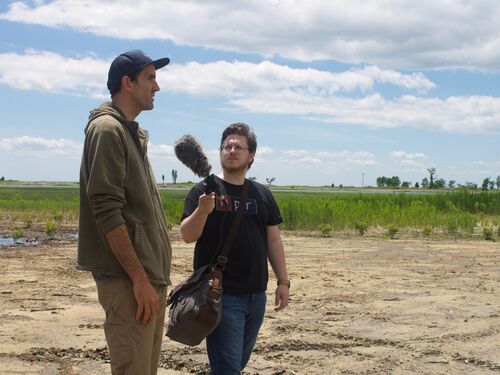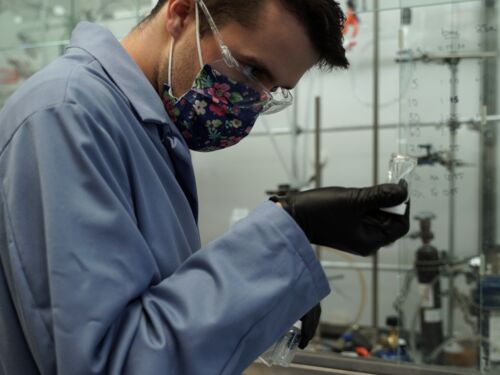Tackling Inequities in Emerging Technologies
Feature Story
By Sara Frueh
Last update May 4, 2023

As technological advances in artificial intelligence, biomedicine, and energy generation help shape society’s future, some researchers are seeking more equitable paths forward than those followed in the past — a subject explored at a recent webinar hosted by the National Academies’ New Voices program.
Historically, for example, when power plants and other energy facilities have been built, nearby communities have had little say in where the facilities are sited or how they’re developed, explained panelist Aditi Verma, assistant professor of nuclear engineering and radiological sciences at the University of Michigan. Typically, engineers have decided what and where the facility is going to be, announced that decision, and then defended it — with results that often heightened inequities.
“Because of this ‘decide-announce-defend’ model of decision-making, we’ve seen large-scale displacements of communities, we’ve seen disproportionately communities of color and low-income communities, especially in this country, having to bear a lot of the harms and undesirable consequences of hosting some of these facilities,” said Verma.
Going forward, as clean, low-carbon facilities are built to meet energy needs and help address climate change, that decision process needs to be revamped, she said. “The big challenge in this space is really developing new processes and new mechanisms for developing these technologies in a way that engages the communities from the earliest possible stages of design and development and also siting —and then throughout this process acknowledging that these communities have important perspectives and expertise ...”
Verma was among the experts who shared their perspectives at the event — part of the One Health Webinar Series, which is designed to foster interdisciplinary discussions about emerging challenges. The webinar was moderated by Baindu Bayon Paicely, a member of the 2021 cohort of the New Voices program, which is devoted to bringing diverse early- and mid-career scientists into the National Academies’ work.
Challenges to equity
A key challenge to equity in biotechnology is that medical research using machine learning and artificial intelligence depends on data from specimens collected from humans, explained panelist Tia Lyles-Williams, CEO of Goffman Bougard. And biotech already has a history marked by racial injustices, such as the Tuskegee syphilis study and the use of Henrietta Lacks’ cells for research without consent or compensation.
Now, some major pharmaceutical companies are approaching historically Black colleges and universities to purchase the biological specimens their hospitals and clinics are storing, Lyles-Williams noted. In general, medical research using AI and machine learning is starting to rely on patients’ blood or urine samples, which raises an ethical issue. “Everybody is doing all of these wonderful things in research and discovery — but it needs to be equitable, where we can figure out how to compensate individuals for their contributions to machine learning and AI,” said Lyles-Williams.
Priya Donti, co-founder and executive director of Climate Change AI, explained how current incentive systems are hindering machine learning from benefiting a broader range of people and contexts.
For example, academic systems judge researchers partly on the number of publications they put out — which encourages progress in settings where large-scale data sets and use cases are readily available, said Donti. This approach disincentivizes the slower process needed to promote community involvement and engage with new stakeholders, including holding dialogues with affected community members to understand if and how there is a use for machine learning before collecting the data.
“We really do need to reshape the incentives in the machine-learning field in order to accommodate and really encourage directions that benefit a wider set of stakeholders across society,” said Donti.
Ensuring community involvement
Accountability structures and review processes need attention as well, Donti explained later in the webinar. A lot has been written about how Institutional Review Boards aren’t necessarily equipped to deal with the ways in which human data comes into machine learning algorithms, because it’s not human subjects data in the way that is traditionally understood, she noted. Academic-public research projects can fall through the cracks of both those academic review processes and also the public review processes that are used to officially procure technology.
“The accountability structure within academia that we were suggesting was a review process for community-engaged research, to ensure that the voices of affected communities — not just the stakeholders in the government — were really being consulted as the project moved forward,” said Donti.
Lyles-Williams said that to make the system work in a more equitable way, communities of color need to be part of the workforce creating AI and machine-learning systems — and that workforce must be broader. “We have to expand opportunities outside of your typical demographic of a bachelor’s degree [or] graduate degree,” she said. “The most common thing everyone does, to a certain extent, is finish high school. So those individuals have to be included in the workforce in some shape, some form to contribute to the AI or machine-learning system.”
Verma pointed to the need for a shared language and processes that institutionalize two-way communication between engineers and community members during the design and siting of energy facilities. “In my absolute best-case scenario, we would have structures that enable not just researchers and companies to go to these communities with their problems or … proposals, but also enable communities to come to us with the challenges and problems they’re grappling with,” she said.
How can researchers and companies and other technology developers be persuaded that it’s worth the effort to adopt more equitable practices? Convince them that it’s in the interests of the long-term health of their project, explained Donti.
“When you incorporate various considerations like equity into the design of how you move forward on something, you do not need to clean up the messes later on that come from not having done so,” Donti said. “If you want to design processes, technologies, strategies that are actually solving the problems that are necessary, that are actually serving the needs of different stakeholders, and that are not problematic in certain ways that will bring the credibility or the use of that down later … you need to take an equitable approach from the get-go.”
Watch the webinar or visit New Voices in Science, Engineering, and Medicine to learn more about upcoming New Voices events.
More like this
Discover
Events
Right Now & Next Up
Stay in the loop with can’t-miss sessions, live events, and activities happening over the next two days.
NAS Building Guided Tours Available!
Participate in a one-hour guided tour of the historic National Academy of Sciences building, highlighting its distinctive architecture, renowned artwork, and the intersection of art, science, and culture.



